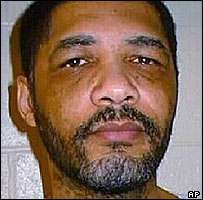Charles Singleton was executed by the State of Arkansas for the murder of Mary Lou York
According to court documents Charles Singleton would go into a store that was owned by Mary Lou York. Singleton would demand money before stabbing the woman twice in the neck. Mary Lou would be rushed to the hospital and before she passed identified Singleton as the person who stabbed her
Charles Singleton would be arrested, convicted and sentenced to death
Charles Singleton would be executed by lethal injection on January 6 2004
Charles Singleton Photos

Charles Singleton FAQ
When Was Charles Singleton Executed
Charles Singleton was executed on January 6 2004
Charles Singleton Case
More than 24 years after he was sent to Arkansas’ death row, convicted murderer Charles Singleton was executed Tuesday night. Singleton, who had been Arkansas’ longest-serving death row inmate, was pronounced dead at 8:06 p.m., four minutes after a lethal injection was administered into his veins. The execution took place inside the death chamber at the Arkansas Department of Correction Cummins Unit.
Singleton’s last words referred to a written statement he left with prison officials. “I was going to speak, but I wrote it down,” he said. “I’ll leave it up to the warden.” Prison officials later released a typed copy of Singleton’s statement.
Singleton, 44, was convicted in 1979 for the stabbing death of Mary Lou York, a Hamburg grocer who had befriended him. York identified Singleton as her killer before she bled to death.
Singleton’s execution had been scheduled five times before Tuesday, most recently in March 2000. His case drew widespread attention because he suffered from schizophrenia, a mental illness that rendered him legally insane without medication. Singleton’s attorney, Jeff Rosenzweig of Little Rock, had argued that the state could not forcibly medicate Singleton to keep him sane enough to be executed. But the U.S. Supreme Court declined to hear Singleton’s final appeal in October and after reviewing the inmate’s medical records last week, Rosenzweig said it was clear that Singleton had been taking his medicine voluntarily.
In the end, Singleton met his fate calmly, according to Rosenzweig and other witnesses. Jason Friedman, a reporter for Little Rock television station KARK-TV Channel 4 who witnessed the execution, said Singleton “coughed briefly, kind of clearing his throat,” after the lethal dose was administered, then closed his eyes and never opened them again. Earlier Tuesday, Gov. Mike Huckabee denied a request for clemency filed by Rosenzweig. In a statement announcing his decision, Huckabee’s office pointed out that Singleton himself did not ask the governor to intervene. Rosenzweig visited Singleton in his cell adjacent to the death chamber Tuesday afternoon and said Singleton wanted to proceed with the execution. “He essentially begged us not to do anything … that would stop the execution,” Rosenzweig said. Rosenzweig said he had sent “draft motions” to various courts that might have intervened on Singleton’s behalf, leaving blank spaces that could be filled in if Singleton exhibited any psychotic behavior Tuesday. “He was rational, sane and really at peace,” the attorney said. “… There wasn’t anything from his behavior that gave us anything to fill in the blanks with.”
Rosenzweig said that in the days leading up to the execution, he and Singleton had several discussions about the inmate’s legal options — which included arguing that lethal injection was unconstitutional. That argument might only have served to change the method of Singleton’s death to electrocution, Rosenzweig said. “He was adamantly against creating any possibility that he could be electrocuted,” Rosenzweig said. In the hours before his death, Singleton visited with Rosenzweig and another attorney, ate a last meal that included two double-soy patty sandwiches, fried eggplant, fried green tomatoes and fried sweet potato slices, and took a shower. “He was really at peace with what he wanted to do,” Rosenzweig said.
Even though Singleton asked Rosenzweig not to intervene Tuesday, the attorney said the execution left him saddened and frustrated. “What happened here will be seen as a shameful mark on the state of Arkansas,” he said.







